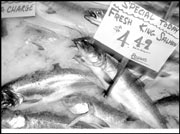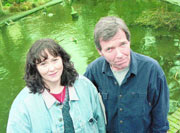David Harsila headed out for the yearly salmon run in Bristol Bay, Alaska, two weeks ago, knowing that even if he has a good haul, the fish may not be worth pulling aboard. This year is one of the bleakest yet for fishermen; prices for salmon, including premium sockeye, have dropped to about what they were in the 1940s, below what Seattle’s Harsila says he needs to make a profit. Roughly half the Bristol Bay fishing fleet, much of which is based here, has disappeared in the last five years.
But on May 31, fishermen won the right to argue in court that it’s not just the unfavorable winds of the market that are sinking them. The Alaska Supreme Court has ruled that an antitrust case filed by Bristol Bay fishermen seven years ago alleging that seafood processing companies engaged in price-fixing should proceed to trial. “This [case] is the sum of fishermen’s complaints from the past 25 years,” says Harsila, president of the Alaska Independent Fishermen’s Marketing Association. The suit accuses the processors, virtually all of whom are based in Seattle and who buy nearly three-fourths of all the salmon caught in Bristol Bay, of conspiring to collectively set raw fish prices much lower than what the market afforded, and of ganging up on and intimidating any processor who didn’t fall into line.
The suit alleges the companies began their collusion in 1988, when the price paid to fishermen for sockeye stood above $2 per pound. Within four years, the price had slid to 70 cents. Harsila, who testified in the case that the prices among all processors became “incredibly identical,” says nothing’s changed since the suit was filed in 1995. Today, Harsila says, the price offered among processors never varies more than half a penny.
Fishermen may hope for relief through a court victory, but the suit has soured already strained relations between fishers and processors. Bruce Schactler, president of the United Salmon Association, says his group has been engaged in a standoff with processors over raw fish prices that have dropped by nearly a third since last year. Meanwhile, he points out, the price of canned sockeye has been rising, fetching $10 more per case this year than three years ago.
Schactler says that in the past, fishermen and processors would commonly negotiate to reach a fair price for raw fish. Harsila says that system has become a futile one for fishermen, because the large foreign corporations which own the processors use their muscle to control the market.
Nothing about the price structures makes any sense to fishermen, Schactler says: Whether they catch a lot of fish or a little, the prices don’t vary. Even more frustrating, he points out, is that the same processors who point to low wholesale fish prices as justification for paying fishermen so little are owned by the same companies who import the farmed salmon from Chile that has done the most to deflate prices. Meanwhile, says Schactler, the major processors show no interest in marketing Alaskan seafood in the United States, where demand is still high, shipping it instead to glutted markets in Japan. Worse, he says, independent buyers who try to gain access to Alaskan salmon to sell locally are afraid of retaliation from the majors.
“People want to know why they can’t get [Alaskan salmon]. How come they never ever see it in the grocery stores?” says Schactler. “You have to come to the conclusion that there is something funny going on.”
The price paid to fishermen took a hit long before the current crop of farmed salmon arrived, argues attorney Parker Folse, representing the fishermen in their Bristol Bay suit. He says it’s clearly documented that the price fishermen were receiving from 1988 to 1992—the years covered by the lawsuit—fell much more sharply than the prices processors were getting.
But Glenn Reed, president of the Pacific Seafood Processors Association, to which several of the defendants in the Bristol Bay case belong, says fishermen are blaming processors for market forces that are beyond anyone’s power to manipulate. “That characterization is borne out of frustration,” Reed says of views like Schactler’s. Reed says his members have gone bankrupt, too, as farmed fish invade grocery shelves. Yes, companies who own Alaskan processors also import Chilean salmon, Reed acknowledges, but that hardly means they’re abandoning their relationship with Alaskan fishermen. “The theory goes that someone who makes a $10 million investment over here is going to go invest somewhere else . . . and say, ‘Screw this other investment.’ I’ve never heard anything so ridiculous,” says Reed. Reed says nothing is stopping fishermen from dealing with independent buyers if they want to accept the risks of dealing with new players.
But evidence submitted by lawyers for the fishermen in the Bristol Bay suit shows that buyers who’ve tried to enter the Alaskan seafood markets offering fishermen higher prices have gotten some pretty rough treatment. In two instances, foreign buyers threatened to cut off upstart processors at the behest of processors based in Seattle, for offering prices that were higher than the going rate.
Doug Sipes, who edits The Fishermen’s News, says it’s difficult for observers in Seattle, the port that handles 90 percent of the catch hauled in from Alaska, to grasp how completely processing companies dominate the remote regions where the fish are landed. Sipes says the tiny villages many fishermen call home during the fishing season are essentially company towns, where fishers are dependent on processors for fuel, parts, food, and other necessities for both their boats and their homes. Many are easily persuaded that they have to sell exclusively to the major processors or else, he says.
Even if fishermen prevail in their suit, no one can say whether it will rescue them from their predicament. Attorney Folse says the primary aim of the case is to get financial compensation for the fishermen who weren’t paid a fair market price for their product in the early ’90s. But Bruce Stanford, a former fisherman and the attorney who initially filed the Bristol Bay suit, hopes a win would do more. “It would give more backbone to antitrust laws already in place and make some changes in this industry,” Stanford says. “They’re not supposed to be doing what they’re doing.”









